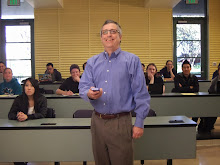
I remember back in the day when VC's took risks and would invest in nascent technologies and markets. Now firms are more interested in piling on a late stage financing for an Uber or Slack after product/market has been de-risked and the only question is whether the sky high valuation will ultimately supported by the financial markets.
For a number of years (or at least since twitter has been around), the Silicon Valley echo chamber has publicly celebrated modest exits or acqui-hires. However, now, it seems that the pendulum has swung so far the other way that failure is being celebrated. Every week there is another post about "how we failed". Medium seems to be the platform of choice to promote your failures.
Here are a few:
I recently had a fireside chat with Dave McClure at SJSU where I questioned Dave about a blog post he wrote on failure, late bloomer, not a loser (I hope). You can skip ahead to the 37:35 mark where Dave lets out the secret that writing about being a loser will get you a huge audience for your blog.
SVCE Speaker Series: Dave McClure from SJSU CoB on Vimeo.
Perhaps, those entrepreneurs are just looking to make a few bucks with google AdSense and Commission Junction while figuring out next career move...
I agree it is good to share lessons learned with other entrepreneurs. Also, if it is cathartic for you to do a post-mortem for the world to see, I'm not going to stand in your way. However, where I draw the line is when failures are treated as less than a little speed bump on the road to success. FAILING SUCKS!! YOU ARE IN THE GAME TO WIN!! EMPLOYEES LOST THEIR JOBS AND INVESTORS LOST MONEY!!
Ok, now it's time to reveal what got ProfessorVC's tighty whities in a bunch. I received this email from a CEO/founder of a company where I was an investor on April 14th at 8:29 PM:
Thank you for your belief in me and the entire team. We had bold visions for how we were going to upend research and investment in the private market, and we wanted to make that vision a reality. Unfortunately, like many startups, we’ve run out of runway to execute. As of April 15, company will be effectively out of cash.Yeah, you read that right! Oops. we're running out of cash tomorrow!! Oh well, we failed...This was with no advanced warning and only bullish statements on company's progress. It's one thing to be an optimistic entrepreneur but another to be delusional and reckless! Apparently the entrepreneur (can't tell you who it is but his name rhymes with Saul Pingh) was too embarrassed or arrogant to respond to my requests for answers and more info. Another investor had to threaten to have his lawyer make the next request before getting a call. It turns out there was ultimately an acquihire and investors may potentially receive a very small fraction of our investment back.
As an investor, I expect to lose money on many of my investments. That's part of being an angel investor and luckily the returns on the winners far exceeds the losses on the losers. However, if entrepreneurs are going to build their companies on other people's money, they need to communicate and work like hell to win! Sorry, contrary to popular belief among the millennials, there is no trophy for losing (actually, a quick google search shows there is one).
Please don't win one of these!
PostScript: The identity of Saul Pingh was discovered by a DC reporter Chris Bing following in the footsteps of those other DC investigative reporters Woodward and Bernstein...Chris attended the celebration of the acquisition (pic below)









